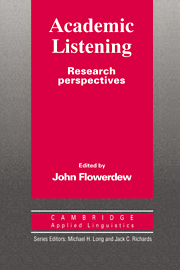Book contents
- Frontmatter
- Contents
- List of contributors
- Series editors' preface
- Acknowledgments
- Introduction
- I BACKGROUND
- II THE SECOND LANGUAGE ACADEMIC LISTENING PROCESS
- III DISCOURSE OF ACADEMIC LECTURES
- IV ETHNOGRAPHY OF SECOND LANGUAGE LECTURES
- Chapter 9 Lecture listening in an ethnographic perspective
- Chapter 10 By dint of: Student and lecturer perceptions of lecture comprehension strategies in first-term graduate study
- Chapter 11 Visual and verbal messages in the engineering lecture: notetaking by postgraduate L2 students
- V PEDAGOGIC APPLICATIONS
- Conclusion
- Index
- Subject index
Chapter 10 - By dint of: Student and lecturer perceptions of lecture comprehension strategies in first-term graduate study
Published online by Cambridge University Press: 05 October 2012
- Frontmatter
- Contents
- List of contributors
- Series editors' preface
- Acknowledgments
- Introduction
- I BACKGROUND
- II THE SECOND LANGUAGE ACADEMIC LISTENING PROCESS
- III DISCOURSE OF ACADEMIC LECTURES
- IV ETHNOGRAPHY OF SECOND LANGUAGE LECTURES
- Chapter 9 Lecture listening in an ethnographic perspective
- Chapter 10 By dint of: Student and lecturer perceptions of lecture comprehension strategies in first-term graduate study
- Chapter 11 Visual and verbal messages in the engineering lecture: notetaking by postgraduate L2 students
- V PEDAGOGIC APPLICATIONS
- Conclusion
- Index
- Subject index
Summary
Abstract
Lecture comprehension strategies of 26 foreign graduate students (FGSs) studying in English or in an English-speaking environment for the first time are examined through their own perceptions and those of graduate school lecturers. A description of current lecture styles and discussion of related comprehension issues follow. Findings include the common and distinctive approaches to comprehension of the group. Common findings include: 1. the importance of oral participation in lectures is growing; 2. 600 + on the TOEFL does not assure comprehension of a lecture that deviates from a straight “talk-and-chalk” style delivered in standard academic speech; 3. students with 600+ on the TOEFL, however, do have the requisite tools and knowledge of the language to acquire necessary proficiency; 4. in order to clarify understanding, the majority of students relied on background knowledge of their subject and were willing to spend long hours on reading assignments; 5. the majority of students did not engage in questioning in class to clarify understanding.
Introduction
First-term graduate students using English as a medium of instruction and/or studying in an English-speaking environment for the first time enter a critical period in their academic life. The successful ones single-mindedly pursue an understanding of the subject matter. They do not pretend to know more than they do. In fact, they work knowing that their comprehension is limited. Like the good adult language learner posited by Naiman et al. (1978: 17), foreign graduate students (FGSs) find “ways to overcome obstacles, whether linguistic, affective or environmental.”
- Type
- Chapter
- Information
- Academic ListeningResearch Perspectives, pp. 199 - 218Publisher: Cambridge University PressPrint publication year: 1995
- 7
- Cited by



